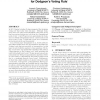Free Online Productivity Tools
i2Speak
i2Symbol
i2OCR
iTex2Img
iWeb2Print
iWeb2Shot
i2Type
iPdf2Split
iPdf2Merge
i2Bopomofo
i2Arabic
i2Style
i2Image
i2PDF
iLatex2Rtf
Sci2ools
102
click to vote
SIGECOM
2010
ACM
2010
ACM
Socially desirable approximations for Dodgson's voting rule
In 1876 Charles Lutwidge Dodgson suggested the intriguing voting rule that today bears his name. Although Dodgson’s rule is one of the most well-studied voting rules, it suffers from serious deficiencies, both from the computational point of view—it is NP-hard even to approximate the Dodgson score within sublogarithmic factors—and from the social choice point of view—it fails basic social choice desiderata such as monotonicity and homogeneity. In a previous paper [Caragiannis et al., SODA 2009] we have asked whether there are approximation algorithms for Dodgson’s rule that are monotonic or homogeneous. In this paper we give definitive answers to these questions. We design a monotonic exponential-time algorithm that yields a 2-approximation to the Dodgson score, while matching this result with a tight lower bound. We also present a monotonic polynomial-time O(log m)-approximation algorithm (where m is the number of alternatives); this result is tight as well due to a compl...
Related Content
| Added | 18 Jul 2010 |
| Updated | 18 Jul 2010 |
| Type | Conference |
| Year | 2010 |
| Where | SIGECOM |
| Authors | Ioannis Caragiannis, Christos Kaklamanis, Nikos Karanikolas, Ariel D. Procaccia |
Comments (0)

